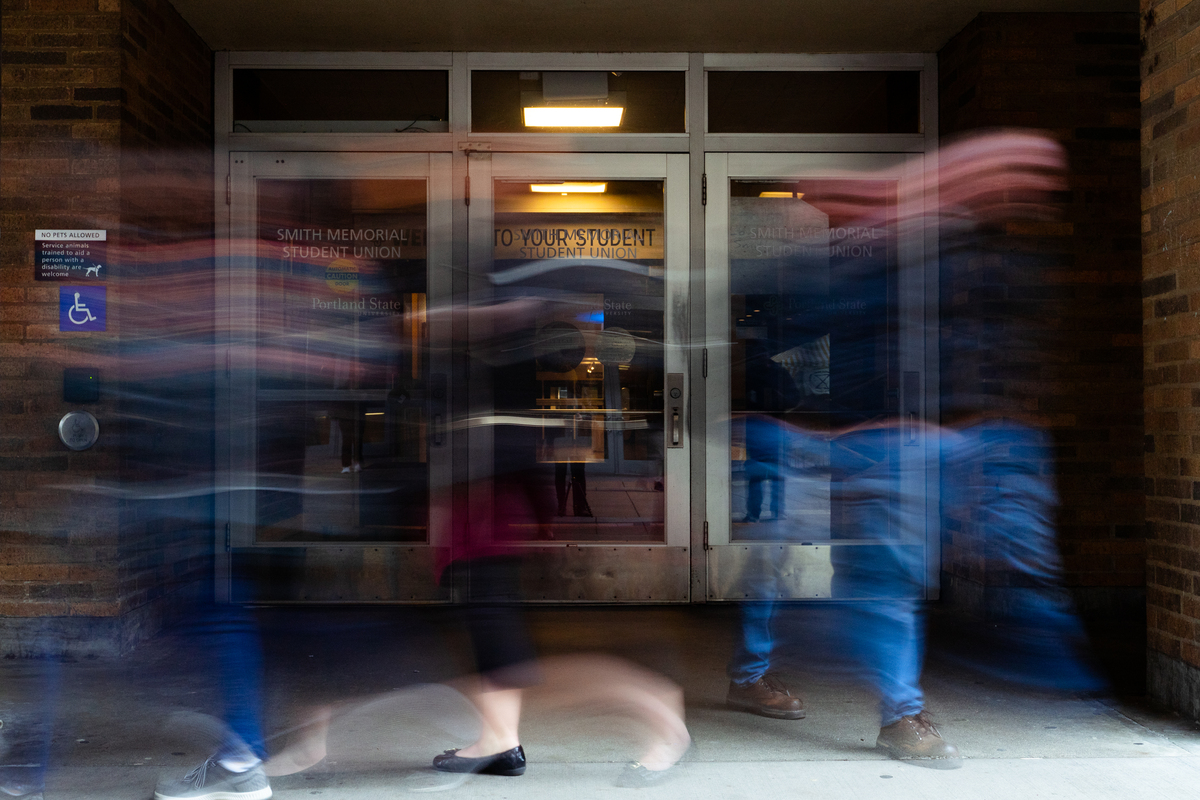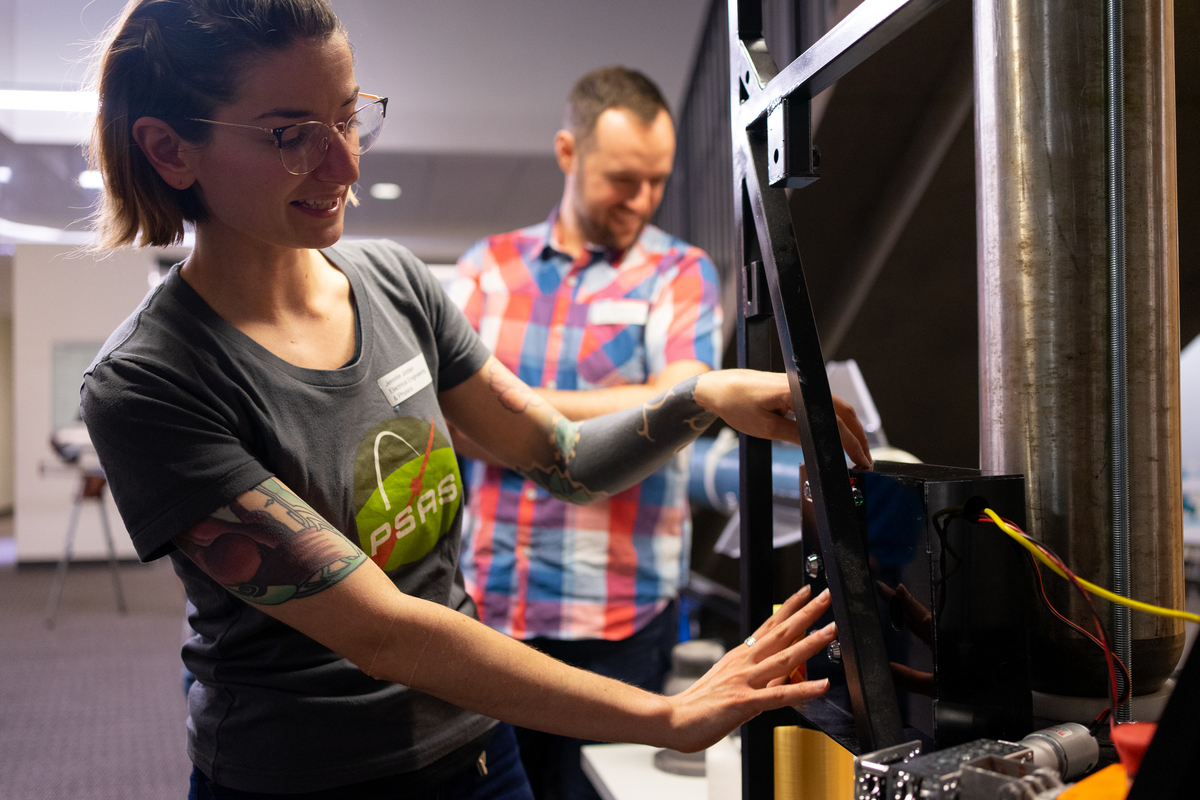A change in policy could decide if building remains public
SMSU hits crossroads
A controversy of compassion is measuring student, faculty and community members’ commitment to unconditional inclusion.
Portland State’s Office of General Counsel (OGC), is proposing to change the Use of Buildings, Grounds and Services Policy at Smith Memorial Student Union.
With its downtown position and proximity to most TriMet transit lines, SMSU’s interior is often filled with a mix between the public and the student body. The building is currently accessible to students and staff from 7 a.m.–10 p.m. Monday–Saturday, though its hours became more restricted to the public in Fall 2019.
The latest proposal would add SMSU to a list of non-public areas on campus, which is typically associated with classrooms, faculty offices and laboratories and allows university administration to restrict some, or even all, areas of the building to students, employees and other guests.
PSU’s 50-acre campus currently consists of 55 owned, operated and leased structures, but few in its building list are truly public. Typically, a PSU ID card is used to gain electronic door access—in some cases, you may also need a separate access card or key to access interior doors.
While the policy plan as a whole is still being evaluated as part of a greater Administrative Policy Development Process, its 21-day public comment and response stage closed on March 9.
PSU’s administration will now consider if any public comment responses are warranted or if they will be responding with any parallel policy plan changes. Once solidified, the policy then goes to the University Policy Committee for final review. If approved, it will be sent to PSU President Stephen Percy’s desk for signature and addition to the PSU policy library.
Restricting SMSU’s building hours for the public, however, also restricts the houseless population who often use the student union as a sanctuary from the elements outside.
Dr. Marisa Zapata, the director of PSU’s Homelessness Research & Action Collaborative, voiced concern over the possible policy change.
“If approved, the closure will send the unfortunate message that even in our most prized gathering space, all are not welcome,” Zapata said.
However, struggling to make distinctions between which spaces are public—which are generally open and accessible, and which spaces are private, spaces reserved for personal use or a specific group—is a part of everyday life for many who live and work in Portland.
In these instances, spatial diagrams provide a framework for how a person functionally relates to the space they’re in. These diagrams are used by architects, developers and school administrations to catalog the sequence of a building’s spaces, or limitations between public versus private spaces that develop from its elements.
PSU’s proposed policy has a similar purpose, stating, “This policy provides general guidelines for the use of space, distinguishing between spaces that are open to the general public…and others using campus services.”
“I am disappointed by [PSU’s] decision to pursue closing the student union to the public,” Zapata said. “Symbolically, student union buildings are meant to be gathering places on campus. To make Smith Memorial Student Union a “non-public” building runs counter to the university’s commitment to creating a welcoming space.”
PSU’s website states, “[Our mission is to] serve and sustain a vibrant urban region through our creativity, collective knowledge, and expertise,” and “[Our Values include a belief that] everyone should be treated with integrity and respect.”
However, to some students, restricting the hours of SMSU betrays this statement by excluding the houseless community.
“[A] faculty member [recently] looked at me and saw the motivated and driven student I have become after being here at PSU for three and a half years,” India Wynne, a former Associated Students of PSU member said. “I was asked…to share [the link regarding PSU’s public comment forum on the Smith Memorial policy change] as the faculty member…assumed what side of this debate I would fall on.”
“What [they] failed to [realize], is that four and a half years ago, I was houseless,” Wynn said. “Like many of my fellow students, I was that person wanting someone to let me in from the cold… Had strangers not shown me kindness…I definitely wouldn’t be the person I am today.”
SMSU is a four-story, 220,435 square-foot campus building at PSU. Located on SW Broadway, Smith houses a myriad of occupants ranging from ASPSU to student media.
Along with this policy change, ASPSU is seeking input from the PSU student body to see if they are interested in supporting a student-funded SMSU renovation project. This inquiry will evaluate different renovation options according to student needs, and will determine both project cost estimates and if associated student fees will need to increase.
A student survey will be distributed on May 6 to determine if PSU students are supportive of a SMSU renovation, financed through an increase in student fees, at any level. If support is found, in both the PSU student body and the Board of Trustees, the project could begin construction in 2022 at the earliest.
Almost every part of the student union has seen a slew of policy changes over the years, down to its name.
From 1958–1968 it was labeled College Center; during 1960–1969, it was branded with some iteration of Library or Library East. It was labeled Smith Memorial Center in 1969.
In 2001, the Smith Advisory Board solicited President Bernstine to make a building name change. It would take the better part of a year to get the approval. This coincided with a series of major renovation and seismic improvement projects so resources were already in place that would make a name change financially viable.
Ultimately it took the moniker of Smith Memorial Student Union (SMSU) as its signature, highlighting that the building changes names during “significant times of change.” This “non-public” policy change coupled with the student-financed proposed renovation project could qualify as a “significant time of change.”
While PSU could decide on the policy within the next couple of months, public interest from both sides of the aisle will continue to rise until this situation is resolved.






